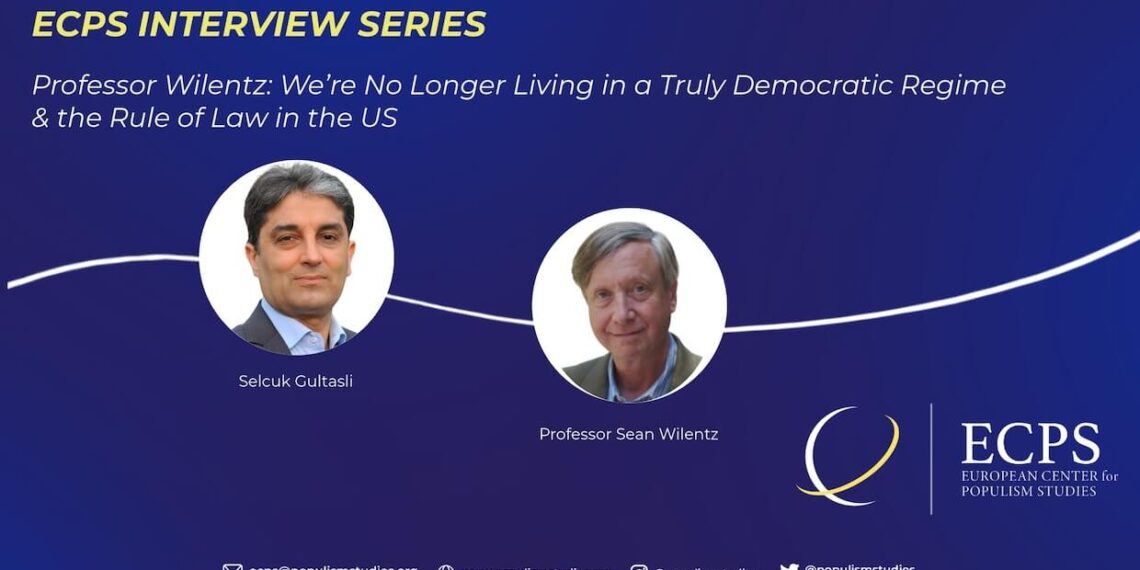In an in-depth and sobering interview with the ECPS, Princeton historian Professor Sean Wilentz warns that the United States has moved “beyond a constitutional crisis” into a state of “constitutional failure.” He argues that the Supreme Court’s presidential immunity ruling has “turned the presidency into a potential hotbed of criminality,” effectively dismantling the rule of law. “We’re no longer living in a truly democratic regime,” he cautions. Linking America’s democratic decline to a “highly coordinated global problem emanating from Moscow,” Professor Wilentz calls for a “democracy international” to counter what he terms a “tyranny international.” Despite his grim assessment, he expresses cautious faith that “most Americans will vindicate America itself” before it is too late.
Interview by Selcuk Gultasli
In a sobering and wide-ranging interview with the European Center for Populism Studies (ECPS), Professor Sean Wilentz, one of America’s most prominent historians and the George Henry Davis 1886 Professor of American History at Princeton University, delivers a stark assessment of the United States’ political trajectory under Donald Trump’s renewed presidency. “We’re no longer living in a truly democratic regime,” he warns, adding that “we’re no longer living under the rule of law, that’s for sure.”
Tracing the roots of this democratic unraveling, Professor Wilentz argues that the United States has moved beyond a constitutional crisis into what he calls “constitutional failure.” In his words, “The Constitution has failed to withstand the attacks upon it that are undermining certain basic American values and basic American rights.” At the center of this failure, he identifies the Supreme Court’s presidential immunity ruling—an “extraordinary” and “completely invented”doctrine that grants the president near-total impunity for acts committed in office. The decision, he contends, “fundamentally changed the character of the federal government,” turning the presidency “into a potential hotbed of criminality.”
For Professor Wilentz, this crisis is not merely legal or institutional but global in scope. He situates America’s democratic backsliding within a “highly coordinated global problem” emanating from Moscow. “You lift the lid and you see Putin’s influence everywhere—whether it’s Marine Le Pen or others, there he is. And certainly in the case of Trump… there are strong intimations that this is what’s happening.” He describes this network as a “tyranny international”—a transnational front of illiberal collaboration linking figures like Vladimir Putin, Viktor Orbán, and Donald Trump. To counter it, Professor Wilentz calls for a “democracy international” built on solidarity among democratic societies: “We can no longer afford to be divided… We have to think of this as something like an NGO, perhaps—a movement, an expression of something we’ve never needed before, but now, we truly do.”
Throughout the interview, Professor Wilentz situates Trumpism within a long American tradition of minority rule and reactionary politics, connecting today’s populist-authoritarian coalition to the legacies of Reconstruction’s overthrow and the racialized backlash against the Voting Rights Act. Yet, he also stresses the unprecedented nature of the current moment: “What we’re seeing today is unparalleled in American history… the authoritarians, the reactionaries, have actually taken power and are holding it.”
Still, despite his grim diagnosis, Professor Wilentz insists on retaining a measure of faith in the endurance of democratic habits. “It’s an enormous test,” he concedes, “but I still believe most Americans will vindicate America itself.”
This interview stands as one of the most forceful scholarly warnings yet about the erosion of democracy in the United States—and the urgent need for a coordinated, global democratic response.


